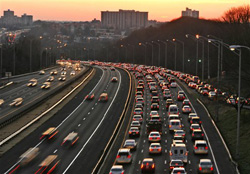It's pretty clear that the United States has absolutely no energy policy at the moment.
Attempts at long-term planning to reduce energy use are largely stalled in the toxic atmosphere of no-holds-barred politics, with the exception of tougher gas-mileage rules for 2017-2025 vehicles that were announced by the Obama Administration earlier this year.
On the one hand, you have numerous small local and Federal programs to encourage conservation, retrofit insulation in homes, require more efficient appliances, and so forth. There's also a desire to bring more energy production on-shore to boost energy security, leading to increased pressure for domestic drilling and natural-gas "fracking".
On the other hand, you have rising public disbelief in climate change, which is largely viewed as accepted science. (Of course, at least one presidential contender said last night he doesn't believe in evolution, so ....)
There's also a visceral aversion by some portion of the electrorate to essentially any Federal efforts to do anything at all, no matter how laudable the goals might be.

Traffic
We mostly stay out of those frays, but we rather like data. In that light, we present a couple of excerpts from "Ten Surprising Facts About Our Energy Landscape," posted by Rocky Mountain Institute (complete with nifty infographic).
For instance, a couple about transportation ...
- The U.S. transportation sector (largely road vehicles) burns 13 million barrels of oil every day, half of it imported.
- Personal transport (largely in road vehicles) is now the second-highest household expense (after shelter), totaling $740 billion in 2009.
The rest of the 10 facts have to do with energy used for other applications, as well as power generation and some projections about how our energy landscape could evolve over the next 40 years to comprise largely natural gas and renewable sources.
Rocky Mountain Institute has a clear point of view--it favors aggressive investment to cut imported oil, roll out renewable sources, and increase the efficiency of energy usage everywhere--but the post gave us some food for thought.
What are your reactions to RMI's post? Leave us your thoughts in the Comments below.
[RMI]
+++++++++++













